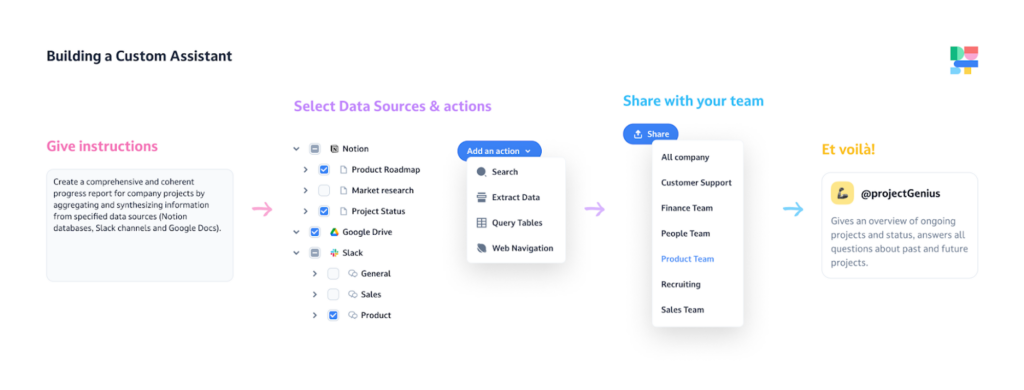Dust, a French firm, raised $16M in Series A led by Sequoia Capital to help businesses create personalized AI assistants for their employees.
The critical thing about Dust is how it differs from other businesses developing enterprise agents or AI helpers in general. Dust assistants are linked to an organization’s data and documents, unlike a tool aimed at consumers, such as ChatGPT. For example, you can link a newly created Dust assistant to Slack, Google Drive documents, Intercom conversations, Notion pages, or documents.
However, Dust feels that businesses should have multiple AI assistants rather than just one, in contrast to most AI firms focusing on enterprise agents. Every assistant could help carry out a specific set of duties and resolve some frequent issues that a particular team is experiencing.
More practically, knowledge-based content and previous help conversations can be accessed by support teams with the use of a Dust assistant. In this manner, new team members in the support department can ask the @supportExpert assistant a question and receive a pertinent response.
Instead of combing a complicated Notion database, HR departments may build an AI assistant that can respond to inquiries regarding corporate regulations. A different agent that can write job descriptions based on previously written job descriptions can also be created. Once more, this gives the organization as a whole more power and provides the HR staff more time.
The use cases are relatively simple for data and engineering teams. A Dust assistant might know the database structures used by the company, for instance. Using simple English, you can ask @SQLbuddy to write an SQL query for your client base.
As a last illustration, sales teams might create draft emails using CRM information and the whole background of a possible customer. The company also offers an API if you need to build your connectors or include Dust helpers in another product.

Dust focuses on creating a product that works for everyone rather than trying to reinvent the wheel. Most people are now familiar with AI assistants, even though many are using them for work beyond company restrictions, following the introduction of ChatGPT a few years ago. They are skilled at striking up a discussion, getting further information, and getting the AI assistant to rephrase its response.
Utilizing Dust is similar because businesses are using the platform to create chatbots. Workers can then use Dust’s online interface or communicate directly with assistants in Slack, allowing them to be @-mentioned in a discussion. Dust aims to make generative AI a daily tool for internal communication for all.
Currently, the startup brings in $1 million annually in recurring income, and some late-stage internet companies—like Watershed, Alan, Qonto, Pennylane, and PayFit—use it extensively.
According to business banking company Qonto, 75% of its 1,600 employees use Dust assistants monthly. Eighty percent of the staff at the French startup health insurance business Alan uses AI helpers every week. With Dust, accounting tech unicorn Pennylane has produced 86 personalized helpers.
Apart from Sequoia Capital, a few of the startup’s previous backers, including GG1, Seedcamp, Motier Ventures, Connect Ventures, and XYZ, are making new investments.
Additionally, Dust needs to develop its foundation model because it takes a customer-focused strategy. You can select the large language model you wish to use for an assistant when you create one. Dust offers integrations with Google, Anthropic (Claude), Mistral, and OpenAI (GPT) for its Gemini models.
Numerous startups are developing enterprise platforms for artificial intelligence agents. Brevian, Tektonic AI, Ema, Korea.ai, and Glenan are some of the names that spring to mind. Even Jira and Confluence’s parent company, Atlassian, an enterprise software behemoth, has introduced its AI partner, Rovo. With its simple onboarding approach, let’s examine if Dust has discovered the ideal go-to-market plan.













